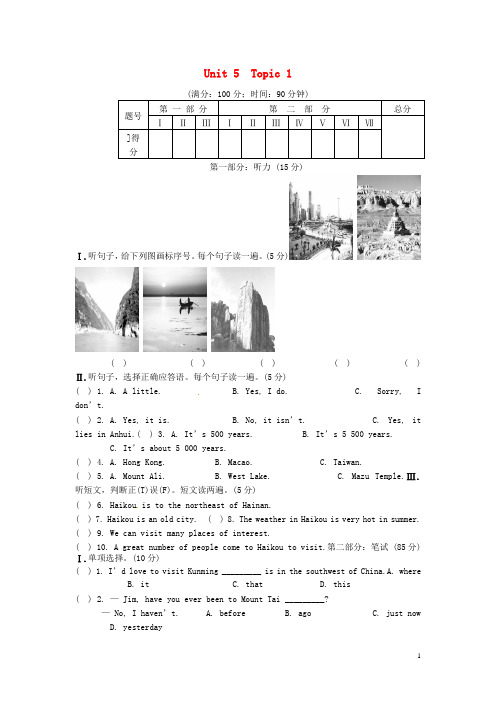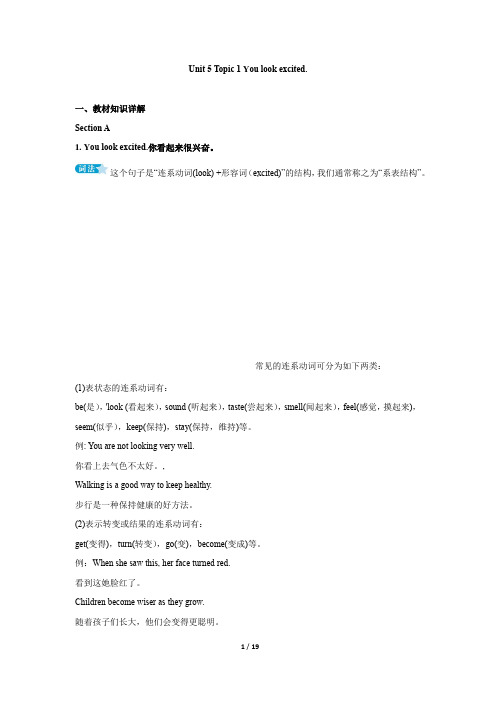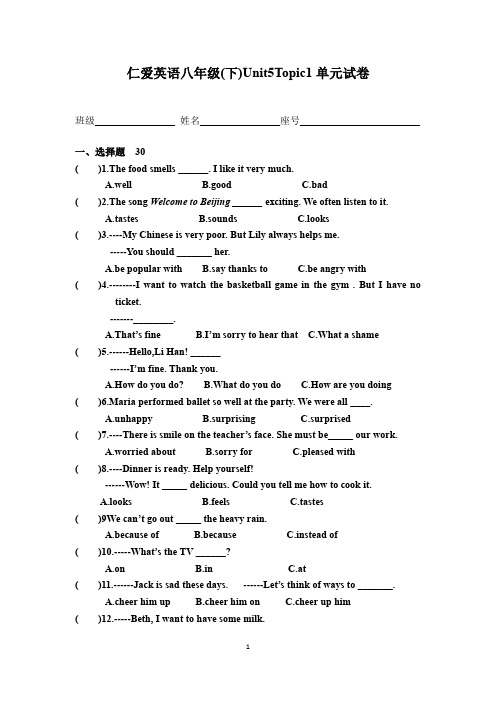Unit 5 topic1
七年级英语(仁爱版)下册 Unit-5-Topic-1 知识点总结语言点归纳

知识点七年级英语(仁爱版)下册Unit-5-Topic-1语言点归纳Unit 5 Topic 1I 重点词汇和短语gate, by, always, plane, train, ship, boat, Ms., grandmother, group, weekday, early, bird, catch, seldom, walk, never, sometimes, ride, park, watch, TV, homework, life, American, or, few, day, rest, play, basketball, swim, ball, game, read, listen, library, once, twice, week, every, must, first, music, begin, while, wall, bed.the same to, come on, on foot, by plane, know about, for a while, watch TV, do (one’s) homework, have lunch, at school, have a rest, be different from, go swimming, listen to, go to bed, go to school, have classes.II 语言点Section A1. a) ---Happy New Year! ---- The same to you! / You, too. 新年快乐!也祝你新年快乐!b) ----Happy birthday! -----Thank you! 生日快乐!谢谢!2. How about you? = What about you? 你怎么样?3. Oh, your new bike looks very nice! 哦,你的新自行车看起来很好看。
九年级英语下册 Unit 5 China and the World Topic 1 China attracts millions of tourists from all over

Unit 5 Topic 1题号第一部分第二部分总分ⅠⅡⅢⅠⅡⅢⅣⅤⅥⅦ]得分第一部分:听力 (15分)Ⅰ.听句子,给下列图画标序号。
每个句子读一遍。
(5分)( ) ( ) ( ) ( ) ( )Ⅱ.听句子,选择正确应答语。
每个句子读一遍。
(5分)( ) 1. A. A little. B. Yes, I do. C. Sorry, I don’t.( ) 2. A. Yes, it is. B. No, it isn’t. C. Yes, it lies in Anhui.( ) 3. A. It’s 500 years. B. It’s 5 500 years.C. It’s about 5 000 years.( ) 4. A. Hong Kong. B. Macao. C. Taiwan.( ) 5. A. Mount Ali. B. West Lake. C. Mazu Temple.Ⅲ.听短文,判断正(T)误(F)。
短文读两遍。
(5分)( ) 6. Haikou is to the northeast of Hainan.( ) 7. Haikou is an old city.( ) 8. The weather in Haikou is very hot in summer. ( ) 9. We can visit many places of interest.( ) 10. A great number of people come to Haikou to visit.第二部分:笔试 (85分) Ⅰ.单项选择。
(10分)( ) 1. I’d love to visit Kunming _________ is in the southwest of China.A. whereB. itC. thatD. this( ) 2. — Jim, have you ever been to Mount Tai _________?— No, I haven’t. A. before B. ago C. just nowD. yesterday( ) 3. Go downstairs and _________.A. fetch me the inkB. fetch the ink to meC.fetch the ink me D. fetched the ink for me( ) 4. Mount Song lies _________ Henan Province.A. toB. onC. fromD. in( ) 5. The surrounding areas of West Lake are the _________ of the famous Dragon Well Tea.A. houseB. familyC. homeD. place( ) 6. China is a big country _________ has a history of about 5, 000 years.A. thatB. whoC. in whichD. in that( ) 7. Luoyang _________ “the Home of Peonies(牡丹)”.A. is famous asB. is famous forC. is famousD. called( ) 8. We visited Jokhang Temple and Yangba Well, and also saw so many_________ people and some other places of _________.A. interested; interestedB. interested; interestC. interesting; interestedD. interesting; interest( ) 9. This place is well worth _________.A. visitB. to visitC. visitingD.visits( ) 10. There are a lot of places which _________ by visitors here. They are Shegutai, Wuliu, Huangcangyll and so on.A. must not missB. shouldn’t missC. shouldn’t be missedD.can’t missⅡ.情景交际。
仁爱版英语八下 Unit 5 Topic 1 重点知识点总结

Unit 5 Topic 1 Y ou look excited.一、教材知识详解Section A1. Y ou look excited.你看起来很兴奋。
这个句子是“连系动词(look) +形容词(excited)”的结构,我们通常称之为“系表结构”。
常见的连系动词可分为如下两类:(1)表状态的连系动词有:be(是),'look (看起来),sound (听起来),taste(尝起来),smell(闻起来),feel(感觉,摸起来),seem(似乎),keep(保持),stay(保持,维持)等。
例: You are not looking very well.你看上去气色不太好。
,Walking is a good way to keep healthy.步行是一种保持健康的好方法。
(2)表示转变或结果的连系动词有:get(变得),turn(转变),go(变),become(变成)等。
例:When she saw this, her face turned red.看到这她脸红了。
Children become wiser as they grow.随着孩子们长大,他们会变得更聪明。
2. My father and mother want to invite your parents to go to the movies.我父母想邀请你父母一起去看电影。
invite vt.邀请。
固定短语:invite sb.to do sth/to somewhere例:He invites us to his restaurant. = He invites us to go to his restaurant.他邀请我们去他的餐馆。
go to the movies = go to the cinema 去看电影invitation n.邀请。
例:I have an open invitation to visit my friend in Japan.我在日本的朋友邀请我随时去看他。
Unit 5 Topic 1 测试题仁爱版英语八年级下册(含答案)

仁爱英语八年级(下)Unit5Topic1单元试卷班级________________ 姓名________________座号________________________一、选择题30( )1.The food smells ______. I like it very much.A.wellB.goodC.bad( )2.The song Welcome to Beijing ______ exciting. We often listen to it.A.tastesB.soundsC.looks( )3.----My Chinese is very poor. But Lily always helps me.-----You should _______ her.A.be popular withB.say thanks toC.be angry with( )4.--------I want to watch the basketball game in the gym . But I have no ticket.-------________.A.That’s fineB.I’m sorry to hear thatC.What a shame( )5.------Hello,Li Han! ______------I’m fine. Thank you.A.How do you do?B.What do you doC.How are you doing ( )6.Maria performed ballet so well at the party. We were all ____.A.unhappyB.surprisingC.surprised( )7.----There is smile on the teacher’s face. She must be_____ our work.A.worried aboutB.sorry forC.pleased with( )8.----Dinner is ready. Help yourself!------Wow! It _____ delicious. Could you tell me how to cook it.A.looksB.feelsC.tastes( )9We can’t go out _____ the heavy rain.A.because ofB.becauseC.instead of( )10.-----What’s the TV ______?A.onB.inC.at( )11.------Jack is sad these days. ------Let’s think of ways to _______.A.cheer him upB.cheer him onC.cheer up him( )12.-----Beth, I want to have some milk.-----There’s _____ left. What about some orange juice?A.noneB.fewC.any( )13.Yesterday a little boy____ the river.A.fell behindB.fell intoC.fell down( )14.He has few friends here,so he feels_______A.happyB.goodC.lonely( )15.He worked ______ and he finished the work. So he felt_____.A.carefully,happyB.carefully,happilyC.carefully;happyily二.完形填空10The telephone rang and Sue answer it. “__1____ I speak to Mrs. Potts,please?” a man asked.“I’m ___2__ you got the wrong number,” Sue said.“I’m ___3___.” The man said.A few minutes passed and the telephone rang again, ___4__ Sue answered it. It was the same man. He made a __5____ again. Three minutes later the telephone rang once more, but Sue decide(决定) not to __6____ it this time. It rang and rang. Her mother heard the ___7____. “Why don’t you answer the telephone,Sue?” she asked.Oh,it’s all right,” Sue said, “I’m _8____it’s that man again” But she was ___9___. It was her father and he was very ____10__, because Sue kept him waiting for a long time.A. B. C.( )1.May Shall Must( )2.glad afraid sad( )3.excuse me disappointed sorry( )4.because when so( )5.living sentence mistake( )6.ask answer call( )7.voice cry sound( )8.sorry sure happy( )9.right careful wrong( )10.moved excited angry三、阅读理解20分AFilms in Beijing Theater This WeekHARRY POTTER (Ⅲ)American filmDirector: Alfonso CuaronStarring: Daniel Radcliffe, Rupert Grint, Emma WatsonTime: From Monday to Wednesday, at 6:00 p. m.Ticket Price:¥50KUNGFU HUSTLEChinese filmDirector: Zhou XingchiStarring: Zhou Xingchi, Liang Xiaolong, Yuan HuaTime: From Wednesday to Friday, at 9:00 p. m.Ticket Price:¥40A WORLD WITHOUT THIEVESChinese filmDirector: Feng XiaogangStarring: Liu Dehua, Liu Ruoying, Ge You, Li BingbingTime: From Friday to Sunday, at 6:30 p. m.Ticket Price:¥40 (Half on Sunday for children)TROYAmerican filmDirector: Wolfgang PetersonStarring: Julian Glover, Brian Cox, Nathan Jones, Adoni MaropisTime: From Tuesday to Saturday, at 9:30 a. m.Ticket Price:¥30根据上述信息,选择最佳答案。
Unit 5 Topic 1【复习课件】八年级英语下册单元复习(仁爱版)

轻轻松松进课堂
He is _u_p_s_e_t /__u_n_h_a_p_p_y _d_is_a_p_p_o_i_n_te_d.
She is very ___s_ad_.
轻轻松松进课堂
She looks very f__r_ig_h_t_e_n_ed. She seems very frightened.
• 1. Mr. Brown couldn’t get a ticket to Avatar, so he
was unhappy.
( F)
• 2. Jane likes the film, The Sound of Music,
because it is very interesting.
() T
• 3. The opera, Cats, is Maria’s favorite. ( T)
3.首先,开始
4.fall into
4.落入
5.in the end
5.最后
6.go mad
6.变疯
e into being 7.形成
8.be full of
8.充满
9.变得对…感兴
9.become interested in趣 10.与…和解
10.make peace with 11.以…结束
英 语
仁爱版 八年级 上册
Unit 5 Feeling Excited 1. You look excited.
1. You look excited.
基础知识过过过 轻轻松松进课堂 高频考点导导航 研析考题点迷津 梳理语法建支架 指导写作构思路
基础知识过过过
1. film/movie电影;影片 3. almost 几乎,差不多
初一英语下册unit5topic1知识点总结

初一英语下册unit5topic1知识点总结初一英语下册unit5topic1知识点总结topic1Howdoyougotoschool?一、重点词语:1.wakeup醒来,唤醒getup起床2.gotoschool去上学gohome回家3.godancing/shopping/skating/swimming去跳舞;购物、滑冰;游泳godoingsomething可用于表达去进行某种娱乐休闲活动。
4.表示交通方式:onfoot步行byboat坐船byship坐船byair乘飞机byplane乘飞机bytrain坐火车bysubway搭乘地铁bycar坐小汽车bybus坐公共汽车bybike骑自行车5.takethesubway/bus/car搭乘地铁;公共汽车;小汽车6.driveacartowork=gotoworkbycar驾车去上班takeabustowork=gotoworkbybus乘公共汽车去上班gotoschoolonfoot=walktoschool步行去上学7.rideabike/horse骑自行车;骑马8.afterschool/class放学以后;下课以后9.playthepiano/guitar/violin弹钢琴;吉他;小提琴playbasketball/soccer/football打篮球;踢足球;打橄榄球playcomputergames玩电脑游戏playwithacomputer玩电脑playsports做运动10.nextto紧挨着,在…旁边11.aplanofmyschool一幅我们学校的平面图12.onweekdays在工作日atweekends在周末13.havebreakfast/lunch/supper/dinner/meals吃早餐;中餐;晚餐;正餐;一日三餐haveclasses/lessons/ameeting上课;上课;开会14.watchTV/movies/games/theanimals看电视;电影;比赛;动物readnovels/newspapers/books看小说;报纸;书15.washone’sfac e/clothes洗脸;衣服16.反义词:up–down,early–late近义词:quickly–fastgetupearly早起belatefor迟到17.thefirst/second/third/fourthday第一;二;三;四天18.cleanthehouse打扫房子19.表示建筑物(尤其学校建筑物):ontheplayground在操场atschool/home/table在学校;家里;桌旁inacomputerroom/teachers’office/classroombu ilding/gym /library/lab/canteen在电脑室;教师办公室;教学楼;体操馆;图书馆;实验室;食堂20.aroundsixo’clock=ataboutsixo’clock大约在六点21.频率副词:never,seldom,sometimes,often,usually,always二、重点句型:1.It’stimetogetup.该起床的时候了。
仁爱版八年级下 Unit 5 Topic 1 课文讲解

Unit 5 Topic 1Section A1.How are you doing?你最近怎么样?如果最近感觉不错的话就回答:I'm fine/quite well,thanks. (And you?),但是如果最近比较糟糕倒霉的话可以这样说:Not so well/Rather badly.还有如果一般般的话就可以说:Just so so/Not so bad.2.You look excited.你看起来很兴奋。
这是一个系表结构,即:连系动词(look )+形容词( excited)。
常见的连系动词可以分为以下两大类:(1)表示状态的连系动词:be(是),look(看起来),sound(听起来),smell(闻起来),feel(摸起来,感觉),taste(尝起来),seem(似乎,好像),keep(保持),stay(保持)等。
如:My grandma is fine.我奶奶很好。
That cat looks very funny.那只猫看起来很滑稽。
The song sounds good.这首歌听起来不错。
The food smells nice.这食物闻起来香。
I always feel tired these days.这些天我总是感觉累。
Miss Tang seems very angry.唐老师好像非常生气。
Running is a good way to keep healthy.跑步是保持健康的一个好方法。
(2)表示动态的连系动词:get(变得),turn(转变),go(变),become(变成) 等。
如:Spring is here; the weather is getting warmer andwarmer.春天来了,天气越来越暖和了。
When she saw the teacher coming into theclassroom,her face turned red at once.当她看见老师正走进教室的时候,她的脸立刻就变红了。
初中英语 仁爱7下Unit 5 Topic1 知识点

Unit 5 Topic1 知识点重点单词1.大门2.乘(车等);靠近3.总是,一直4.快点儿;加油5.步行6.飞机7.火车8.船,轮船9.小船,轮船10.平日11.早的12.鸟13.捉住;接住14.有时15.很少;不常16.步行;散步17.决不,从来没有18.骑(自行车、马等)19.公园20.观看;注视21.电视;电视机22.看电视23.电影24.开始25.在学校;在上课26.在……后27.床28.篮球29.游;游泳30.听,仔细听31.音乐;乐曲32.图书馆,图书室33.周;星期34.一次;从前35.两次;两倍36.伟大的,极好的37.墙38.长城39.生活;生命40.美国人41.或者;否者42.结束;穿过43.在…上面44.更多的;更多45.谈话重点短语1.go …on foot = walk ( to )…2.at the school gate在学校大门口3.on weekdays在平日 ,在工作日4.on weekends=on the weekend在周末5.You are right. = That’s right. 你是对的。
6.play soccer 踢足球7.see a movie 看电影8.get up 起床9.after school 放学后10.after class 下课后11.after breakfast / lunch / supper12.早餐 / 午餐 / 晚餐后13.at school 在学校、在上课14.play soccer/basketball 踢足球/打篮球15.go swimming/fishing 去游泳/钓鱼16.listen to music 听音乐17.watch TV 看电视18.d o one’s homework 做作业19.go to the zoo/ park 去动物园 / 公园20.read books/a book 读书21.in o ne’s free time在某人空闲时间22.have a rest 休息一下23.meet friends 拜访朋友24.once/twice/three times a week 一周一/两/三次25.very often 经常26.every day 每天e to the library 来图书馆28.时间表达:i.8:00 eight o’clockii.9:05 nine o fiveiii.10:15 ten fifteen / a quarter past teniv.11:30 eleven thirty / half past elevenv.12:45 twelve forty-five/ a quarter to onevi.17:50 seventeen fifty / ten to eighteen29.go to bed 上床睡觉30.talk with / to sb.与某人谈话31.at school 在学校、在上课32.go to school 去上学33.and so on ……等等34.go to…on foot= walk to… 步行去…35.go to…by bike = ride a bike to… 骑自行车去…36.go to…by car = drive a car to… 开车去…37.go to…by plane = fly to… 乘飞机去…38.go to…by subway/underground39.= take the subway/ underground to… 乘地铁去…40.go to…by bus/train/ship/boat = take a bus/ train/ship/boat toi.乘公共汽车/火车/轮船/小船去…重点句型1. Happy New Year!The same to you.2. Your new bike looks very nice. Thank you.3. — How do you usually come to school?—I usually come to school by subway.4. —How often do you go to the library?—Once/Twice/Three times a week/Very often/Every day/Seldom(对划线部分进行提问)What time does the class begin? / What time do the classes begin?7. We have no more time. 我们没有更多的时间了。
- 1、下载文档前请自行甄别文档内容的完整性,平台不提供额外的编辑、内容补充、找答案等附加服务。
- 2、"仅部分预览"的文档,不可在线预览部分如存在完整性等问题,可反馈申请退款(可完整预览的文档不适用该条件!)。
- 3、如文档侵犯您的权益,请联系客服反馈,我们会尽快为您处理(人工客服工作时间:9:00-18:30)。
Unit 5 topic1重点短语the same to by subway come onon foot go to school on weekdaystake a bus watch TV see a moviefor a short time at school go to bedlisten to music have classes the Great Wallknow about play soccer in one’s free timeonce/twice a week go swimming语法一般现在时及频度副词的用法重点句型及交际用语1.--Happy New Year! --The same to you!2.--How do you usually come to school?-- I usually come to school by subway.3.It’s time for class.4.The early bird catches the worm.5.I seldom walk to school.6.We’d like to know about the school life of American students.7.They seldom eat out on school days.8.What does Han Qing usually do after school?9.--How often do you come to the library?--Once/Twice/Three times a week./ Very often/Every day/Seldom/Never.知识点讲解1. --How do you usually come to school?-- I usually come to school by subway.(1)how 是用来对交通工具的提问--How does your brother go to work? --He often goes to work by bus.(2) “by+表示交通工具的单数名词(注意:by后不能加a/an/the/one’s/this/that等修饰词)”是一种常见的表示乘坐某种交通工具的介词短语。
常见的类似短语还有:by bike, by bus, by car, by plane/air, by train, by ship/boat/sea, by subway等。
We often come here by plane.2.Oh, it’s time for class. Come on!(1)“it’s time for+名词”表该是做某事的时间了。
It’s time for supper.(2)come on “快点儿,加油,来吧”Come on! Let’s dance together.3.频度副词:always _____________ usually____________often__________ sometimes_______ seldom_________never___________4.Maria sometimes takes the subway home.(1)take the subway“乘地铁”,一般情况下,乘坐交通工具有两种表达法:一.take a/an/the+表示交通工具的单数名词(是动词短语,直接作谓语). 二. by+表示交通工具的单数名词(为介词短语,在句中作状语,不能直接作谓语)。
I usually take a bus to work.= I usually goes to work by bus.(2)take the subway home. 在此home为副词,因此前面的介词省略。
5.What do they do in their free time?What do/does sb. do?用于询问某人做某事或职业What does your father often do after lunch?--What do you usually do on Sundays? --I usually watch TV at home.--What does your brother do? -- He is a doctor.in one’s free time 在某人空闲时候6.--How often do they have ball game? --Four times a year.How often 是对频率对次数的提问Once/twice/three times a year 一年一次/两次/三次Unit 5 Our School LifeTopic 1 How do you usually come to school?Ⅰ.单项选择。
(10分)( )1.The Browns usually drive to the park on Sundays. But today they go to the park _____ .A.on feetB.on footC.by footD.on the foot( )2.Bob often _____ his _____ after supper.A.do; homeworkB.does; homeworkC.begin; homeworkD.begins; homework( )3.The boy likes playing _____ basketball very much.A.aB.anC.theD./( )4.—_____ does he meet his friends?—_____ a month.A.How often; TwiceB.How long; TwiceC.When; TwoD.What time; Two( )5.—What do you usually do _____ weekdays after school?—I usually play football.A.inB.atC.onD.for( )6.Mr. King sometimes _____ the subway home.A.takeB.takingC.takesD.to take( )7.—What does Fang Yan do in her free time?—She often goes _____.A.swimmingB.swimC.to swimD.swims( )8.—What time do you usually go to bed?—_____ about a quarter to ten.A.ForB.AtC.InD.On( )9.Zhao Lin _____ to Beijing by train often. He usually goes by plane.A.isn’t goB.doesn’t goC.doesn’t goesD.don’t go( )10.Sam _____ walks to school. He always go to school by bike.A.sometimesB.oftenC.neverD.seldomⅡ.情景交际。
(5分)根据对话的情景,从方框中选择适当的句子填在画线处,使对话完整通顺。
其中有两项是多余的。
A:Hi, Wang Li! What time do you usually get up on weekdays?B:I always get up at about six o’clock.A:11 How do you usually go to school?B:12 But sometimes I go to school by bus.A:By the way, where does your mother work?B:She works in a factory. She makes shoes.A:13B:She usually goes to work by subway.A:Where does she have lunch?B:14 It takes her too much time to come back home for lunch.A:Oh, it’s time for class. 15B:Let’s go.A. The early bird catches the worm.B. How does she usually go to work?C. By bike.D. How often does she go to work?E. She has lunch in the factory.F. What about you?G. Come on!Ⅲ.完形填空。
(10分)On Sundays, Li Lei gets up at six thirty. He has 16 at eight. Then he helps his mother 17 the housework. At ten he leaves 18 and goes shopping 19 . At about eleven o’clock he comes 20 home.He likes 21 very much. He helps his mother with the cooking. They 22 lunch at twelve.In the afternoon he often 23 games with his friends. They have 24 at six thirty. In the evening he does his homework. Sometimes, he 25 TV. He goes to bed at nine.( )16. A.food B.breakfast C.lunch D.supper( )17. A.in B.on C.with D.from( )18. A.home B.house C.room D.classroom ( )19. A.by bike B.by a bike C.by the bike D.by his bike ( )20. A.for B.to C.back D.from( )21. A.cook B.cooking C.the cook D.the cooking ( )22. A.to have B.having C.have D.has( )23. A.plays B.is playing C.takes D.is taking( )24. A.work B.homework C.housework D.supper ( )25. A.sees B.looks C.is watching D.watches第三部分写作Ⅰ.词汇部分。
